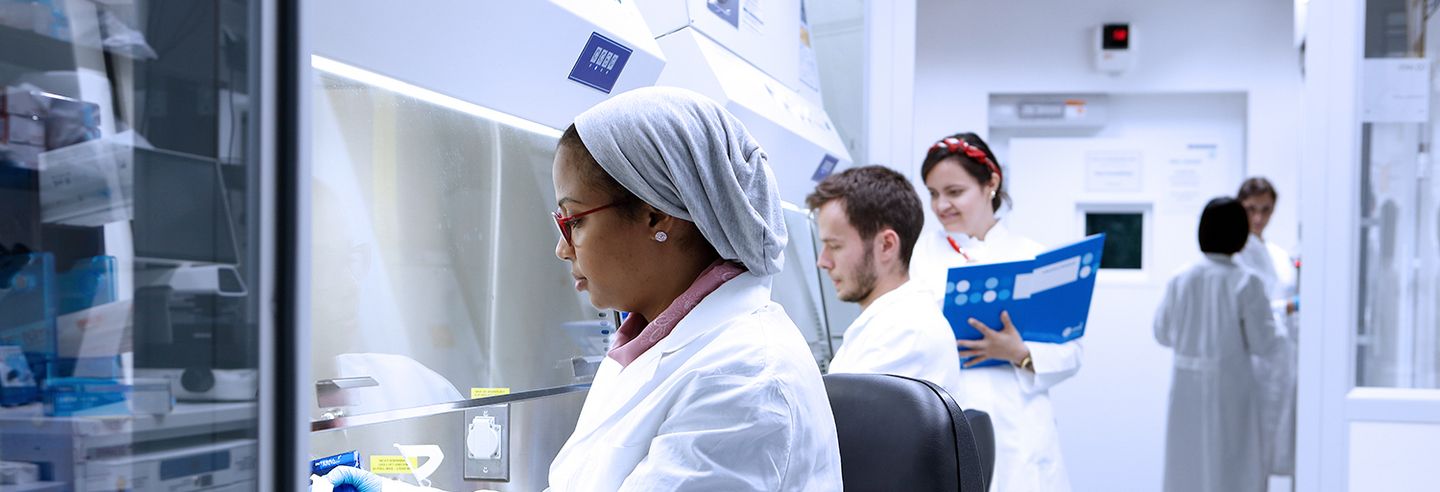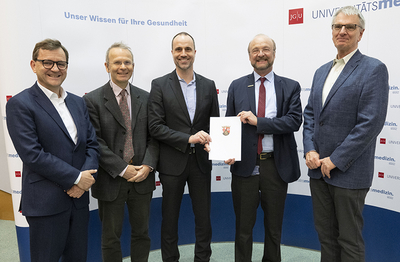This collaborative programme between the University Medical Center Mainz (UMC) and the Institute of Molecular Biology (IMB), Mainz, aims to strengthen translational ageing research by funding clinician scientists studying ageing and age-related diseases.
Ageing is one of the biggest and most urgent challenges facing modern societies today. In Germany alone, over one-fifth of the population is over 65 years old, a number which will only increase as life expectancies around the world continue to rise. One of the biggest problems with an ageing population is that the elderly are at higher risk of developing debilitating and often incurable illnesses such as cancer, cardiovascular disease and neurodegeneration, increasing individual suffering and placing a major burden on society.
To address these challenges, clinician scientists need to be trained – medical doctors who balance the care of elderly patients in the clinic with internationally competitive research in the lab to develop innovative treatments. The goal of CHANCE is to meet this need by funding the training of clinician scientists specifically in the field of molecular and translational ageing research. Prof. Wolfram Ruf (Alexander von Humboldt Professor and Scientific Director of the Center for Thrombosis and Hemostasis at UMC), says “Clinician scientists are crucial for medical progress. CHANCE will enable physicians to establish themselves as internationally competitive researchers during their clinical training and profile building. Top-level translational research is only possible through basic research informed by a clinical view of essential questions. The translational research supported by CHANCE will further expand the field of healthy ageing at the UMC.”
The clinician scientists in CHANCE will be able to strengthen their scientific profile in research centres at UMC, the Leibniz Institute for Resilience Research (LIR) and IMB. Prof. Dr Ulrich Förstermann (Scientific Director and Dean at UMC), adds “Within the framework of CHANCE, the participating doctors will have the opportunity to pursue their own high-quality research project focused on healthy ageing. In addition, the Mainz Research School of Translational Biomedicine (TransMed), which administers CHANCE, will offer close mentoring and a comprehensive accompanying curriculum. Thus, CHANCE mediates both specific expertise relevant to ageing research and key general scientific qualifications.”
CHANCE complements the CHA’s existing Science of Healthy Ageing Research Programme (SHARP) for PhD students and is funded by Rhineland-Palatinate’s Ministry of Science and Health with €1.2m. Clemens Hoch, the Minister for Science and Health, says “The state government pursues the goal of strengthening research in the life sciences in general and healthy ageing in particular. We have laid a solid foundation through our long-term funding over the past 20 years. Clinician scientists and advanced clinician scientists play a crucial role in the interface between patient care and cutting-edge biomedical research, helping to create a vibrant academic research culture at university hospitals that focuses on unmet clinical needs. This project is a great addition to the ageing research already existing in Mainz and complements its activities as a centre of science and research, which has developed ageing as an important interdisciplinary research focus in recent years”.
Further details
Further information:
https://www.cha-mainz.de/clinician-scientist-programme-chance
About the Institute of Molecular Biology gGmbH
The Institute of Molecular Biology gGmbH (IMB) is a centre of excellence in the life sciences that was established in 2011 on the campus of Johannes Gutenberg University Mainz (JGU). Research at IMB focuses on the cutting-edge fields of epigenetics, genome stability, ageing and RNA biology. The institute is a prime example of successful collaboration between a private foundation and government: The Boehringer Ingelheim Foundation has committed 154 million euros to be disbursed from 2009 until 2027 to cover the operating costs of research at IMB. The State of Rhineland-Palatinate has provided approximately 50 million euros for the construction of a state-of-the-art building and is giving a further 52 million in core funding from 2020 until 2027. For more information about IMB, please visit: www.imb.de.
About the Centre for Healthy Ageing
The Centre for Healthy Ageing (CHA) is a virtual research centre launched in 2021 that brings together scientists in basic and clinical research from across Mainz that focus on ageing and age-related diseases. These findings should be used to promote healthy ageing and to find treatments that could prevent or cure age-related disease. For more information, please visit: www.cha-mainz.de.
About Johannes Gutenberg University Mainz
Johannes Gutenberg University Mainz (JGU) is a globally recognized research-driven university with around 31,000 students from over 120 nations. Its core research areas are in particle and hadron physics, the materials sciences, and translational medicine. JGU's success in Germany's Excellence Strategy program has confirmed its academic excellence: In 2018, the research network PRISMA+ (Precision Physics, Fundamental Interactions and Structure of Matter) was recognized as a Cluster of Excellence – building on its forerunner, PRISMA. Moreover, excellent placings in national and international rankings as well as numerous honors and awards demonstrate the research and teaching quality of Mainz-based researchers and academics. Further information at www.uni-mainz.de/eng
Boehringer Ingelheim Foundation
The Boehringer Ingelheim Foundation is an independent, non-profit organization that is committed to the promotion of the medical, biological, chemical, and pharmaceutical sciences. It was established in 1977 by Hubertus Liebrecht (1931–1991), a member of the shareholder family of the Boehringer Ingelheim company. Through its Perspectives Programme Plus 3 and its Exploration Grants, the Foundation supports independent junior group leaders. It also endows the international Heinrich Wieland Prize, as well as awards for up-and-coming scientists in Germany. In addition, the Foundation funds institutional projects in Germany, such as the Institute of Molecular Biology (IMB), the department of life sciences at the University of Mainz, and the European Molecular Biology Laboratory (EMBL) in Heidelberg.
Press contact for further information
Dr Ralf Dahm, Director of Scientific Management
Institute of Molecular Biology gGmbH (IMB), Ackermannweg 4, 55128 Mainz, Germany
Phone: +49 (0) 6131 39 21455, Email: press@imb.de

